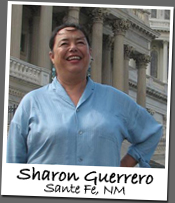I was working with the GED program at the Santa Fe Community College, when I switched over to Salazar Elementary School to be the coordinator of the 21st Century afterschool program in the Santa Fe Public School District. The population is primarily bilingual. The majority of the students are immigrants from Mexico and from other Latin American countries. Back in Chicago, where I lived for 20 years, the “whole-house” model was ingrained in life for even the most challenging neighborhoods. I was glad to be able to bring that knowledge to my new home in New Mexico. We operated the afterschool programs in the community school model at Salazar. We had about 70 volunteers from local churches come in to work with the kids. We teamed up with the Santa Fe Community College to offer parents computer classes, ESL and other resources. When I started in my job as Afterschool Coordinator for the district, my focus was to get afterschool programs into the high schools and middle schools. We have a high dropout rate in our community that we were not targeting through afterschool. Traditionally, we only offered afterschool programs to elementary school children. After a certain age, parents in our community let kids stay home to take care of younger siblings. Many students go home to an empty household everyday. One of the most rewarding experiences for me was a successful intervention we had with a young man entering high school. He was a high risk youth from a very unstable background. He had started in our homeless family program. His parents were challenged financially, and his family dealt with domestic violence. We worked with the entire family so that this young man could focus on making a successful transition into high school. Our afterschool programming gives an incentive for the middle school students to come to school. Afterschool is attractive for them because it provides alternative learning experiences. While we do provide homework help and other academic support, we provide other fun activities like our community garden program and our environmental project where kids can actually study samples of our local rivers. We even give the kids physical challenges that include a climbing wall. Kids in our programs can get the science, social studies and math learning concepts through fun, innovative activities. Kids in our programs are learning to communicate and perfect their English a lot faster because of the opportunities they have to interact with peers. Learning English is important for these kids. I see many of them trying to assimilate while navigating between two cultures. They sometimes get bullied and are too stressed to study and succeed academically. It is a challenge to get support and prove that programs are working. I think I was able to show that the work—providing quality afterschool care for our kids— is a community effort not just a school thing. Our goal is to empower parents to be advocates for their children and also to make the school more welcoming for them In some cases, our afterschool staff have more interaction with the parents than the classroom staff. Personally, I am passionate about the projects we offer, like the community garden project and the food security programs, to help our community as a whole and getting kids involved in these programs. I’ve learned that kids can do anything. They empower my work. EDITOR'S NOTE: The author is a former Afterschool Ambassador. | 







